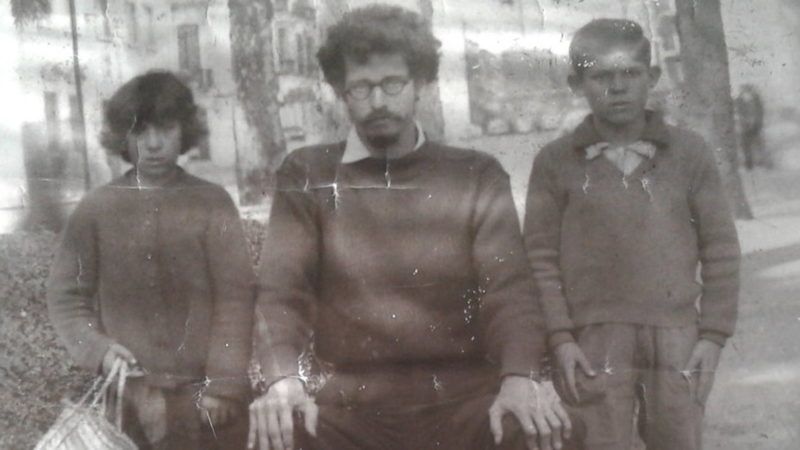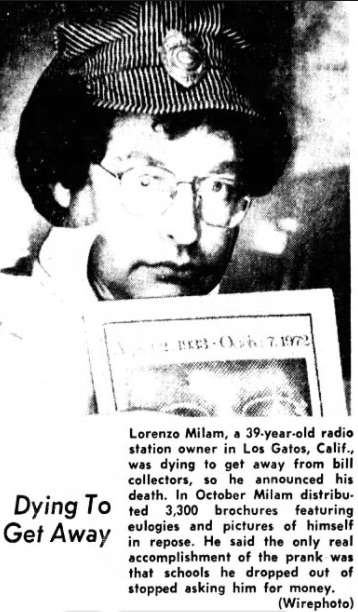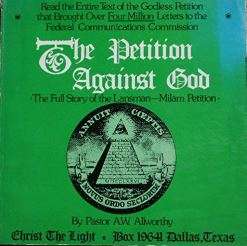The Death of a Radio Pioneer
Lorenzo Milam, 1933–2020

A broadcast pioneer just died in southern Mexico, a few weeks shy of his 87th birthday. Back in the 1960s and '70s, Lorenzo Milam helped launch about a dozen offbeat FM stations—eclectic, adventurous outlets that tried to avoid the straightjacket formulas of both commercial and public radio. He also wrote one of my favorite books about radio, Sex and Broadcasting, and one of my favorite memoirs, The Cripple Liberation Front Marching Band Blues.
He published a bunch of other books too, some under his own name and some pseudonymously. He wrote for literary journals, disability magazines, radio program guides, and the Whole Earth Catalog; he even did a couple of articles for Reason. For a while in the '60s he had a column in the Seattle Post-Intelligencer. His best-known piece of writing was a petition to the Federal Communication Commission, but hardly anyone actually read that one—they just passed along word of what was allegedly in it, and it became an urban legend.
He also dabbled in low-power TV and maintained a small philanthropic operation, whose recipients ranged from Paul Krassner's The Realist to a program teaching Mexican moms how to make soy milk. He edited a magazine called The Fessenden Review, which later mutated into a website called RALPH. I think at one point he may have owned a trailer park in Tijuana. He was gay, disabled by polio, and eventually an expatriate, so he brought an outsider's perspective to his projects. And radio desperately needed an outsider to shake things up by the time Lorenzo Milam came along.

Lorenzo was born in Florida in 1933. He first got interested in broadcasting as a kid, tuning in to black stations in the segregated South. "There were a number of characters I used to listen to," he told me years later, as I was writing my radio history Rebels on the Air. "There was Daddy Rabbit 'with the do-right habit' and Hank the night watchman and Pappy Schrappy ('makin' you happy'). They were true wits and originals—storytellers in the best southern tradition….Hank and Daddy Rabbit and Pappy would tell stories (often rather lecherous ones)—would skirt the border between lurid and gross and hilarious, but always with a wit that made it impossible for those of us listening in to complain."
Lorenzo worked for a few conventional stations in the 1950s. And then, when he started studying at Berkeley, he discovered KPFA, a noncommercial outlet run by the Pacifica Foundation. At this point in its history, KPFA was a highbrow station devoted to free speech and the arts. "It was the BBC for the United States," Lorenzo later described it to me. "I don't know if you've ever heard the BBC Third, but that's what it was. It was very intellectual. So many of the things that came later really destroyed that absolutely magnificent voice of reason that KPFA represented. It was a wonderful mix of music and talk and drama and high art." He soon got involved with Pacifica himself, where he butted heads with the station's Stalinists. ("I call them Stalinists. That's how their minds worked. They began to snuff out the wonderfully diverse opinions that appeared on the station and made it a mouthpiece for the humorless left.") One way to think of the stations that Milam went on to found is to imagine the highbrow radicalism of early Pacifica crossed with the lowbrow creativity of Hank and Daddy Rabbit.
Lorenzo's first attempt to start a station began in 1958. His original plan, inspired in part by the Beat writer Lawrence Ferlinghetti's poem "Tentative Description of a Dinner to Promote the Impeachment of President Eisenhower," was to bring some explicitly pacifist programming to Washington, D.C. Lorenzo's father had done well for himself speculating in real estate, and when he died his son inherited enough cash to raise the capital required to put a station on the air. But he ran into regulatory problems, and he ended up spending "two mind-wrenching, soul-crushing, nut-numbing years of chasing Radio Bigfoot through the halls of Congress, into the East Wing of the White House, down the dark halls of the Federal Communications Commission." Because Milam had worked at Pacifica, the FCC suspected that the young man who had kept grumbling about Stalinists back in Berkeley might actually be a Communist. When he asked his congressman for help, he got an earful about subversives who "take freedom of speech, and freedom of the press, and turn it against the very country that provides it." It was an object lesson in how a regulatory agency can block political expression without coming out and saying that it was blocking political expression.
After two years of trying, Lorenzo gave up. So he submitted a new application—this time to broadcast in distant Seattle, where there was little risk that a senator might stumble onto his subversive signal—and he hired a respected law firm to pursue it for him. Eventually, the lawyers prevailed. KRAB-FM went on the air in 1962, and Lorenzo ran it from then until 1968. (The station survived without him until 1984, and a successor station, KSER, has been on the air since 1991. Full disclosure: I was a DJ at KSER for a brief spell in the late '90s.)
Chuck Reinsch runs a great website, the KRAB Archive, that digitizes and posts recordings of KRAB's old broadcasts; if you'd like to get a sense of how diverse the place's programs could be, I highly recommend checking his site out. Suffice to say that if a Seattleite tuned his dial to 107.7 FM in the era when Lorenzo was in charge of the station, he might hear a Bulgarian brass band, a radio play, a reading from Dr. Dolittle, a Trotskyist commentary, a John Bircher commentary, a program of Japanese court music, or an experimental attempt to broadcast home movies over the radio. Or he might not hear anything at all. "Lorenzo thought it was a good idea to have dead air between programs," former KRABber Tad Cook told me. That way, listeners would have "time to absorb what was going on and think about it."
KRAB didn't run ads, and in those days it didn't get support from the Corporation for Public Broadcasting either—the Corporation for Public Broadcasting didn't exist yet. So it wasn't commercial radio, and it wasn't government radio either; it was, along with Pacifica, a model for something new, something that came to be called community radio. Though that wasn't how they initially saw themselves. "We weren't called community stations," Lorenzo told me. "We were called listener-supported stations. That was the key….We were part of the elite, and we knew it. And we for no minute confused ourselves with being representative of the community. We were there to lead in an enlightened way." The community-participation part of the credo came later, as the '60s melted into the '70s.
Lorenzo launched more listener-sponsored stations after he left Seattle, in places ranging from Dallas to Los Gatos, California. He had an indirect hand in starting several more: If someone disagreed with him about how a station should be run, Lorenzo might stake him some money to start another outfit in another city and try things his way. Veterans of those outlets in turn started stations of their own. These stations then mailed tapes to each other, allowing their programs to pop up in other parts of the country. In this way they formed an informal network, dubbed the KRAB Nebula, parts of which persist to this day. (Lorenzo also co-owned, but did not run, one of the most gloriously quirky commercial stations of the '70s: KFAT, a free-form country station in Gilroy, California. Its motto: "It's all country music. It just depends on what country you come from.")
These stations saw a lot of infighting, especially after they started to absorb the discordant tumult of the latter-day New Left. In the wake of a particularly ugly experience at the Dallas station KCHU (pronounced "ka-chew" and known as "the wet spot on your dial"), Lorenzo had a nervous breakdown and decided he should do something else with his life. After the '70s, he had very little to do with radio. But before he left, he gave the broadcasting world a gift that just might stay with us forever: the so-called Petition Against God.
The background to understand here is Milam's stormy relationship with the Federal Communications Commission. He despised the agency, writing in Sex and Broadcasting that it, "like most independent regulatory commissions," tends "to be run by those it was supposed to be regulating." But he also offered readers tips on how to use the commission's rules to compel stations to give them airtime: The FCC was awarding incumbent broadcasters a "quasi-monopoly," he reasoned, and this was a way around those barriers. For a while he saw the Fairness Doctrine—a now-abandoned policy that gave the government the power to punish broadcasters for being insufficiently balanced—as a "good device" to get "time for free in order to present your views on some subject." He lost some of that enthusiasm after people started wielding the Fairness Doctrine against his stations—not to get their views on the air, which he would have been happy to do without any outside intervention, but to inflict regulatory headaches. By the time I got to know him, Milam was advocating what he called "the real honest true deregulation of broadcasting." This would go much farther, he wrote, than the "ersatz deregulation proclaimed by the Reagan administration." It had more in common with an approach that Italy had adopted in the 1970s: "Anyone is permitted to buy and operate a broadcast transmitter. You go to your local equivalent of Radio Shack and buy an FM or television transmitter and you are on the air….Italian stations can take risks and more easily tolerate competition because the owners haven't had to invest millions of lira just getting permission to go on the air."

But before he arrived at this more radical vision, Milam was known to send the FCC ideas for ways to tweak its rules. In 1971, for example, he suggested they add a carrot to the stick of the Fairness Doctrine, with "a positive bribe" to air controversial material. And in 1974, he and his longtime collaborator Jeremy Lansman petitioned the commission to be more choosy about who can use those FM and TV channels that are reserved for educational broadcasting. More specifically, they asked the FCC to put a freeze on applications from religious groups and from government-owned entities. From this there sprang a rumor that there was a push to ban religious broadcasting, not just to exclude it from that narrow segment of the spectrum, and letters began to pour in to the commission urging it to reject the petition. The FCC did, in fact, reject the petition in 1975, but the letters kept coming in. Well into the 21st century, they were still coming in, as new versions of the legend circulated through the internet. When The Washington Post covered the rumor in 2001, its reporter found that the FCC had received "more than 10 million letters, e-mails, and phone calls" asking it not to kill Christian radio. At one point, the commission started running public-service ads to assure everyone that religious broadcasting was safe. But still the responses come.
I don't really agree with Milam and Lansman's petition, because I don't think the FCC should be zoning a special section of the FM dial for educational use in the first place; I'd rather make it easier to start noncommercial stations than to maintain a reservation for them. In other words, I prefer that Italian system. But I have to admire what those two managed to do with their petition. To create an urban legend that outlives you: That is immortality.
Lorenzo did a lot outside the world of radio too, more than I can really do justice to here. But I don't want to end this without quoting two more things he wrote—a pair of essays that between them suggest a world where that Italian approach spreads to far more than just the broadcast band. One was an angry rant he published in KCHU's program guide in 1976, bristling at an ad campaign sponsored by the Free Enterprise Institute. "Most of us sincerely believe in Free Enterprise," he declared:
We value what it represents for the individual. Hell, most of us would give our eyeteeth to live in a country that honored and believed in Free Enterprise. But when we are faced with the wrenching knowledge that United Fruit runs the CIA, ABC runs the FCC, Lockheed runs the State Department, Mobil Oil runs the Texas branch of the legislature, and the telephone company runs them all: when we are faced with that bitter knowledge—we are forced to the droll conclusion that we could only have free enterprise if the big corporations would get the hell out of the way. As long as they write the laws they work under, frame the taxation rulings that they are to follow, infest the regulatory commissions that are supposed to regulate them: as long as they do this so richly and so well—the rest of us won't even have a crack at "free" enterprise. It's just too damn expensive.
So where can you find some genuinely free enterprise? In 1996, Lorenzo declared that he'd located it in Tijuana:
In TJ, it's a veritable democracy of bribery—everyone, even the poorest worker, is allowed to buy up a bit of the government. If, for example, you want to set up a taller to fix cars in your front yard, you do it. All you do is pay a regular fee to the representative of the city—your monthly tax for doing business, a permitless business permit, if you will. In cash….
As soon as new settlers come in from Southern Mexico, they move onto any convenient vacant land, and the local version of the TJ zoning department comes out to complain, and soon enough, he's gone, with his bakeesh, and then a community begins, people build tiny houses out of whatever material is available—no building department inspectors necessary—and within weeks, the private bus companies start sending in their eight or ten passenger caláfias to connect them with the rest of the city, and, soon enough, someone sets up a car-repair service in their front yard; and someone else establishes a grocery in their front room, and someone else sets up a taco stand on the streetcorner in front of the grocery. The community grows from scratch: real and diverse (and safe). It's "local land-use planning" without any of those arrogant $150,000-per-year Berkeley School of Planning graduate students coming out in their $40,000 Toyota Land Cruisers to tell you what to do.
I last heard from Lorenzo two years ago. "i've just finished my last book—i sent off the last proofs the very day i had a stroke," he told me. "i can no longer write, except short emails like this." And then, in a followup: "If I could, I'd write a long story about the very strangeness of losing myself."
I don't know what life was like for Lorenzo in the days before he died. But in one of those final two emails, he told me he was "strangely content, living my last days in oaxaca, with a few loyal mexicans who have to literally carry me hither & yon." I hope he stayed content until the end.


Show Comments (15)